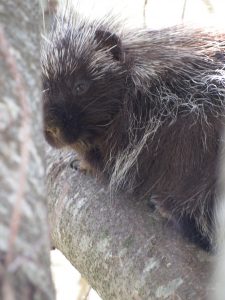
1974 WHAT MAKES THE DIFFERENCE?
I was in Toronto and as usual I got a copy of the Globe and Mail to scan while eating my breakfast. Again as usual I looked at the column on the inside written by Bruce West for many years. Bruce grew up in Huntsville and had been with the paper forever so long.
I was a bit surprised to see that the story that morning was about the shooting of a porcupine that was gnawing the steps of a summer cottage. I was a bit taken back, for Bruce was always a man who did not believe in killing. But this account went into details about how the animal was dispatched by a couple of shots to the head, wit a small rifle. So in my mind I composed a letter to Mr. West asking him why he had had a change of heart. Then I re-read the article, and discovered it had been written by another person. Later that day I was discussing it with a friend, and he informed me that Bruce West was in semi retirement, and only occasionally wrote an article. If I remember correctly the writing had been done by Scott Young.
But why kill a porcupine? Especially when so many groups in the southern part of the province deplore the killing of any wild creature. The porcupine is perhaps the most inoffensive of all the wild animals. True, it does chew at any place there happens to be a salty flavour, and a lot of dogs have had quills in their noses from coming too close. Had these dogs been minding their business they would have come to no harm. But why brag about killing it? My friend and I decided that the reason the porcupine was chewing at the front steps was because the owner had perhaps been short taken during the night, and was not inclined to leave the veranda, and urinated on the steps, and that would be the reason the porcupine was gnawing at them. But you see, this animal was bothering someone from the city, and it makes a difference. In the woods it is not supposed to matter.
A few years back two men on snowmobiles killed a brush wolf on Lake Simcoe. They too bragged about their kill with the result there was a law passed making it illegal to hunt any animal from these machines. It is true they might have dispatched this little animal with an axe, which they had, or an ice chisel, instead of running it over many times with their machines. And they could have just collected the bounty and said nothing. But the incident was so widely played up in the papers, just about the time some groups were selling the idea of what noble creatures wolves were, that it was blown up all out of proportion. But no one said a word about the porcupine.
In the winter of 1967-68 I spent all winter in the city as I had a rebuilding job done on my bad leg, and Rod MacKay looked after the few traps I had set. One trip he returned to Toronto with a large wolf. His son wanted to take it to school for show and tell, as few if any pupils could come up with a wolf. But the principal said no. It just might have rabies, and cause some trouble in the school. But again, it did not matter if this “noble creature” had been sick up north. It did not matter there.
Same winter a brush wolf wandered right into the city. Alarms were sent out, and the animal, perhaps scared to death of all the noise and confusion was surrounded and finally shot by a policeman. Why or how the wolf came into the city no one seemed to care. Not one voice was raised in dissent, only that an animal that might have injured children had been disposed of. Again, if the animal was so dangerous in the city, why are they such noble creatures up in the north country? Or perhaps it does not matter what happens up in the woods.
I just made these comparisons to show how little people who live in the southern sections know of conditions in the north. The trouble is, the Nature Groups are well organized, and have a lot more say in what goes on in the woods than those of us who live there all the time. I think it is not right that so many people in the south should think they should be making rules for those of us who live and work in the woods.